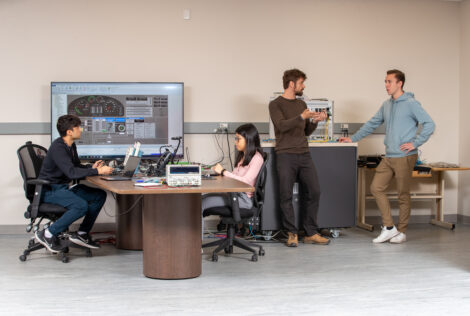
Expertise
Software engineering, software architecture, DevOps, domain-specific languages, compilers, software composition
Areas of Specialization
Research Clusters
Current status
-
Accepting graduate students
-
Undergraduate Advisor for Software Engineering
Computing and Software
-
Associate Professor
Computing and Software
-
Associate Chair for Undergraduate Studies - Internal
Computing and Software
Overview
I’ve joined McMaster University in January 2022 as an Associate Professor of Software Engineering. Before joining Mac, I was Associate Professor of Software Engineering at Université du Québec à Montréal from 2019 to 2021. I received my Ph.D. in Computer Science from Université de Nice (France) in 2010. I was a postdoctoral student at Inria Lille-Nord Europe in 2011 before joining SINTEF (Oslo, Norway) as a research scientist. I then joined Université Côte d’Azur in 2012, where I was Assistant and then Associate Professor, in charge of the Master of Software Architecture. Starting December 21, I hold a full-fledged P.Eng. license in Québec.
My research interests are related to software engineering, and more specifically, scalable software composition, domain-specific languages and modelling. In addition, I apply my research to various domains such as cloud computing, cyber-physical systems, and, more recently, source code and micro-services architecture. My research has been conducted closely with industrial partners and has led to several technological transfers.
I am currently developing the Abstract Composition Engine (ACE) to factorize knowledge about software composition and support engineers when defining new ones for their very own domain. Instead of rewriting each part of the composition from scratch in their own universe, they will reuse off-the-shelf elements and customize them for their needs. Automated reasoning approaches will analyze the given artifacts and the used operators to automatically infer properties (thanks to static analysis or reference benchmark usage) on the composed system and support its assessment in a scalable way. Such properties can be functional (i.e., domain-specific) or non-functional (e.g., associativity, idempotency). Based on these properties, it is possible to analyze the expressed composition directives and the resulting model. The idea here is to apply approaches like query rewriting to optimize the composition directives in a scalable way.
Did you know?
When working from home, lectures or Zoom calls might be interrupted anytime because the cats will be playing with the webcam wires.
I am also quite good at breaking software and information systems.
If we ever have to travel together, be prepared for flight cancellations
PhD in Computer Science (2010, Université Nice – Sophia Antipolis)
M.Sc. in Software Engineering (2007, Polytech Nice – Sophia Antipolis)




